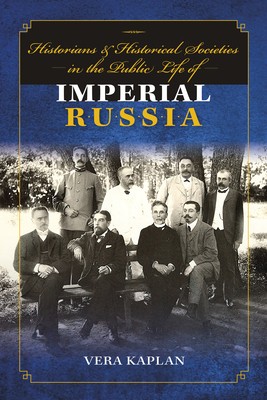
- We will send in 10–14 business days.
- Author: Vera Kaplan
- Publisher: Indiana University Press
- ISBN-10: 025302398X
- ISBN-13: 9780253023988
- Format: 15.2 x 22.9 x 1.9 cm, hardcover
- Language: English
- SAVE -10% with code: EXTRA
Historians and Historical Societies in the Public Life of Imperial Russia (e-book) (used book) | bookbook.eu
Reviews
Description
What was the role of historians and historical societies in the public life of imperial Russia? Focusing on the Society of Zealots of Russian Historical Education (1895-1918), Vera Kaplan analyzes the network of voluntary associations that existed in imperial Russia, showing how they interacted with state, public, and private bodies. Unlike most Russian voluntary associations of the late imperial period, the Zealots were conservative in their view of the world. Yet, like other history associations, the group conceived their educational mission broadly, engaging academic and amateur historians, supporting free public libraries, and widely disseminating the historical narrative embraced by the Society through periodicals. The Zealots were champions of voluntary association and admitted members without regard to social status, occupation, or gender. Kaplan's study affirms the existence of a more substantial civil society in late imperial Russia and one that could endorse a modernist program without an oppositional liberal agenda.
EXTRA 10 % discount with code: EXTRA
The promotion ends in 17d.19:23:11
The discount code is valid when purchasing from 10 €. Discounts do not stack.
- Author: Vera Kaplan
- Publisher: Indiana University Press
- ISBN-10: 025302398X
- ISBN-13: 9780253023988
- Format: 15.2 x 22.9 x 1.9 cm, hardcover
- Language: English English
What was the role of historians and historical societies in the public life of imperial Russia? Focusing on the Society of Zealots of Russian Historical Education (1895-1918), Vera Kaplan analyzes the network of voluntary associations that existed in imperial Russia, showing how they interacted with state, public, and private bodies. Unlike most Russian voluntary associations of the late imperial period, the Zealots were conservative in their view of the world. Yet, like other history associations, the group conceived their educational mission broadly, engaging academic and amateur historians, supporting free public libraries, and widely disseminating the historical narrative embraced by the Society through periodicals. The Zealots were champions of voluntary association and admitted members without regard to social status, occupation, or gender. Kaplan's study affirms the existence of a more substantial civil society in late imperial Russia and one that could endorse a modernist program without an oppositional liberal agenda.


Reviews